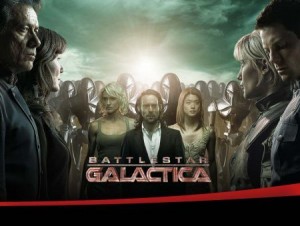 Caprica 1.0, part one of the initial season of the Battlestar Gallactica spin-off/prequel, has ended. In great BSG fashion, they’ve put a big ol’ cliffhanger in the middle of the season. People seem to agree that there really isn’t any problem with Caprica, except that we just really miss BSG.
Caprica 1.0, part one of the initial season of the Battlestar Gallactica spin-off/prequel, has ended. In great BSG fashion, they’ve put a big ol’ cliffhanger in the middle of the season. People seem to agree that there really isn’t any problem with Caprica, except that we just really miss BSG.
Ron Moore should be applauded for attempting to draw in old fans, without creating rehash. He promised that Caprica would be like Dallas with robots.
Whereas BSG exploded from the beginning with the genocide of 12 planets and the countdown of survivors, Caprica has spent its first few episodes introducing us to the world that was and the interwoven lives of the two families the shown revolves around.
There are no characters like Adama or Rosalin, whose drive and ethics anchored BSG with hope. Caprica is about weak and twisted characters: a mad scientist, an alcoholic wife, a corrupt lawyer and an assassin. Then there are the kids, a handful of angst ridden teenagers being sucked into online madrassas and terrorism. The weight of the plot is on kids who aren’t old enough to fly a Viper.
Despite its risks, Caprica has a lot of promise. By being different, it tells its own story and challenges us in new ways. Perhaps even more than BSG, it explores the themes of religious terrorism and extremism, and gives us clues to what our world could become. And has cool robots.
Check out Caprica at www.hulu.com/caprica.


 I delayed watching the final episode of Battlestar Gallactica, not wanting to say goodbye. The well crafted story ark, evolving characters, and social/religious, not to mention sexy robots, have been a good friend for five years.
I delayed watching the final episode of Battlestar Gallactica, not wanting to say goodbye. The well crafted story ark, evolving characters, and social/religious, not to mention sexy robots, have been a good friend for five years. The final episode climaxes with Dr. Baltar, whose self seeking manner has driven much of the storyline, suddenly has an epiphany. This provides the answer for every mystery, and the key to survival. “I see angels,” he says.
The final episode climaxes with Dr. Baltar, whose self seeking manner has driven much of the storyline, suddenly has an epiphany. This provides the answer for every mystery, and the key to survival. “I see angels,” he says. We are sadly witnessing the last season of the most daring and complicated Space Opera to ever hit the small screen. Like any good science fiction, Battlestar Gallactica is little more that a thin veneer of sci-fi, used to address complex social issues. They’ve taken on war, racism, suicide, terrorism, and the threats of theocratic goverments.
We are sadly witnessing the last season of the most daring and complicated Space Opera to ever hit the small screen. Like any good science fiction, Battlestar Gallactica is little more that a thin veneer of sci-fi, used to address complex social issues. They’ve taken on war, racism, suicide, terrorism, and the threats of theocratic goverments.





 Tweets
Tweets